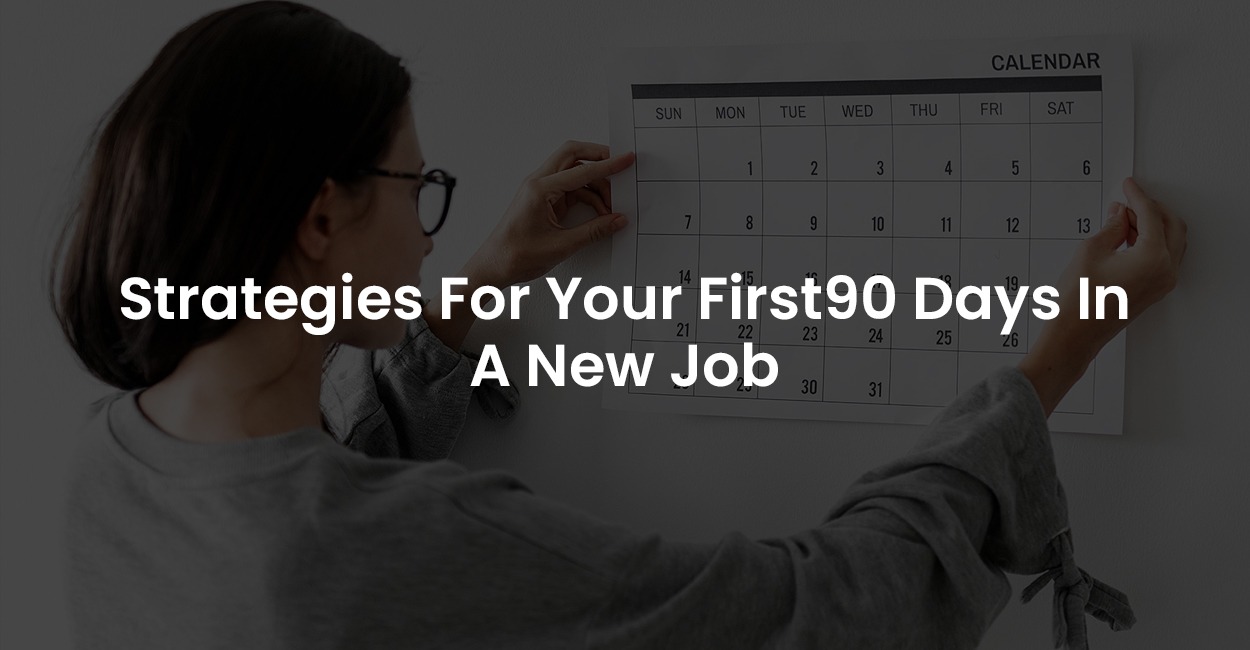Strategies For Your First 90 Days In A New Job
- In Career Advice
- 06 Feb 2023, 03:53 AM

It's normal to have a little bit of tunnel vision when you first start out in a new position since the only way you'll ever be able to flourish and stand out in your field is by mastering the details of your work. Although this training is crucial for your career at the organisation, you'll succeed even more if you start planning ahead from the onset.
A new job is like a blank book, and you are the author.
It’s true when you’re first starting in a new role, you begin writing a new chapter each time you face roadblocks, learn advanced skills, acquaint yourself with other colleagues, work on a new project and so on. However, what you achieve in your first 90 days sets the tone for your final chapter in that role.
Admit it or not, you can set yourself up for success in your new career within the first 90 days. Why 90 days in particular? It's a quarter, and it's a well time range in the business. Firms assess their performance depending on how much development they make each quarter—and you should, too. It is a critical period, regardless of your specific situation. Indeed, it is argued that impressing your manager and coworkers within the first 90 days is crucial to your performance in your current employment and your entire career achievement.
In this article, you’ll find a 90-day plan widely used by new employees in setting goals and mapping out how they will achieve them in this time frame. With this strategy, you will wow your new boss and colleagues.
Things to do on your first day
Mentally advance yourself. Michael Watkins, the best-selling author of The First 90 Days, suggests actively letting go of your former work and envisioning yourself in a new career.
Here are a few tips on what you can do to prepare yourself to make a great impression on your first day at a job.
Email your new boss- probably before a week asking if you need to prepare for anything beforehand and just tell them how excited you are, revisit what you said in that interview.
Send LinkedIn connections- to new colleagues before you arrive. Tell them how excited you are about joining them. Always, always have a friendly starting point. So that when you get there, it's going to be all kind of familiar, you'll feel like you know them.
Read company reports- or newsletters and industry blogs, subscriptions, because these are conversations, you can have with people on your first day.
Re-read the job specs- and the description and understand exactly what it is that you're going to need to do, and maybe even send a message to HR.
You do your route to work- before you start to eliminate any delays on your first day.
Remember- that you are not expected to go in and know it all. First, you must focus on listening to everyone and understanding how things work.
Mistakes to avoid
Respect others' time and space, ask essential questions, and avoid basic questions that you will ultimately find out from the HR guidebook that is not important for your first day. People can sometimes fail to embrace a new business culture, failing to make people feel seen, heard, and valued. So take the time to talk to people, be interested in them, find out what they do every day, how you can add value, and just get stuck with people who will help.
On your first day, ask your manager these four questions
When your manager onboards you, they will only provide you with around 60% of the knowledge you need to succeed. This occurs because our supervisors have forgotten what it's like to be a newbie. It's human nature for us to take our knowledge for granted. So, where does the other 40% of information come from? Your questions. You must proactively ask your manager and coworkers questions to fill in the blanks. For example:
1- What should I achieve in my first 30, 60, and 90 days?
It is so important to understand what success looks like in your new role. Get this down, nearly word for word in writing. Ask about the company-level and business goals, and then build out your own 90-day goals.
2- How will my work be measured?
It is very easy to feel that you are working hard in your role, but then later down the line, realise that your manager is measuring you using a different metre stick. Get clear on how performance is measured and which levers in the business your role pulls.
3- Which tools and documents will I employ? And, can you confirm that I get access to them right away?
You should enter your new role expecting to have to do a lot of self-study. Where you are reviewing documentation that existed before being hired. The most challenging part is that often your colleagues forget to give you access to things. By asking this question, you can ensure you have everything you need by the end of the meeting.
4- What expectations do you have?
It's so important to set baseline expectations right at the beginning of your time at the company. You can ask specific questions such as, how many hours am I expected to work? Does it matter which hours are in particular, or is it flexible? How are vacations approved, and what should be considered before asking for one? Understand when different communication methods are used, such as messenger, email, video call, and phone calls. Your manager will have preferences for the way they like to work. Adapt your work to meet their preferences as, while you prefer to chat over instant messenger, they may ask for everything to go through email. Each question can lead to a series of fascinating follow-up questions. So, take it upon yourself to keep being curious each step of the way and make up for that 40% gap of information that your manager wouldn't have told you otherwise.
Make the most of your time and effort at your new work
We have this notion that to do well in a job and to get promoted, we need to work hard, and others will notice, but timing time again, that is disproven. Your performance does matter while on the job, but two other more significant factors are predictors of whether or not you will be perceived as a high Performer. Performance, Image and Exposure ( PIE).
Performance only accounts for 10% of career success, and the image is 30% of success, meaning how you are perceived by people who work with you. And finally, exposure accounts for 60% of someone's success, which means that people know what you've done and how it matters to the organisation. PIE is a crucial way to look at your career, be sure to take actions that enhance your image and increase your exposure to ensure your effort in your new job is well worth it.
How to get noticed at your new job
According to Harvey Coleman’s PIE framework, you can get noticed by increasing your image and exposure, as those two aspects of PIE account for 90% of your career success.
Image means how you are perceived by people who work with you. This starts with you having personal relationships with people at the company. Take time to get to know as many people as you can in your first few months so that they have a positive impression of you and are more likely to go to you for help, advice, and answers. Take an interest in what your coworkers are working on, and proactively find ways to help them. It may be offering to proofread something, to walk them through how one of your previous employers did what they are working on, and so on.
Exposure means that people understand what you've worked on and how that is a meaningful contribution to the company. It is evident that executives promote those whose work they have noticed themselves. So what you want to do here is celebrate wins often. One example is publicly praising coworkers and team accomplishments you are a part of. This will put more attention on what you work on and make other people more likely to shout you out in the future. Additionally, managers want to hear the praise of their employees. So, if you ever get great recognition from a coworker or a customer, forward that to your manager, and another approach is to inform and involve more stakeholders in your projects. Be sure to focus your efforts on performance, image, and exposure, especially in your first few months at a job. This will set the tone and the first impression of you as a high performer that will pay immense dividends over time.
Set boundaries in your new job
This is your chance to enter your new opportunity with the proper boundaries. So many working norms are set without a conversation, such as people may email you at 8:00 p.m., and you reply immediately, solidifying the norm that you can be contacted outside of work hours. Or a coworker asks you to create the calendar event even though it's not your meeting. And somehow, you become the unofficial scheduler. Whatever it is, I want you to sketch out your expectations right here, right now, for accessibility, scope and authority.
For accessibility, this addresses when and how the company is accessible to your time. Discuss with your manager when our work hours. Are they set times? Or can you work whenever? Even if you can set your hours, part of that is communicating what those hours are for you so that you are not expected to be emailed back when you're off the clock. Also, how often are you expected to be in the office? Is there a particular time you're expected to arrive and leave? This may seem a little silly to get this specific, but people do have judgments about the right way to do things. And at least if they say that they are flexible and only care about you getting results, then they have now heard themselves articulate this norm which is so important.
Next for scope. Get clear about what your job is and what is not your job. Coworkers may innocently give you work to do, and you need clarity from your manager to allow you to say this isn't in the scope of my role. Potentially, the name of someone else on the team can clarify who does that. If you are ever asked to do work that doesn't seem within your scope, bring it up immediately to your manager. You either need to set a boundary that this isn't part of your job or have it be acknowledged that your role is expanding, which is excellent ammunition to help you ask for a raise.
And finally, authority. You have to get a clear understanding from your boss. What decisions am I empowered to make? When do I need your approval? When do I require others' approval? In what situations do my colleagues have authority? It's amazing how often in a company where it can be confusing when a bunch of team members join a meeting, and no one knows who owns the meeting. It's also effortless in a new company to move too quickly where you thought you had the authority to make a decision, but your boss wanted to review it first. Or you are waiting for approval when you're in charge. Get clear on this to know when to step up and step back. Burnout is common among professionals today, but you can get ahead by having these expectation conversations early and setting boundaries as soon as they arise.
Maintaining momentum in your new job
Set a reminder for yourself once a month to ask yourself these questions. Are there any coworkers or people in my network that I should check in on? This is your moment to reconnect quickly. The second question is, how am I doing on my goals? This is a moment to track any progress on your goals and realign with them. The third question is, are the right meetings on my calendar? Which meetings should be removed, and who in the business should you start having more touch points with? Revisit those and make sure they are reinforced.





